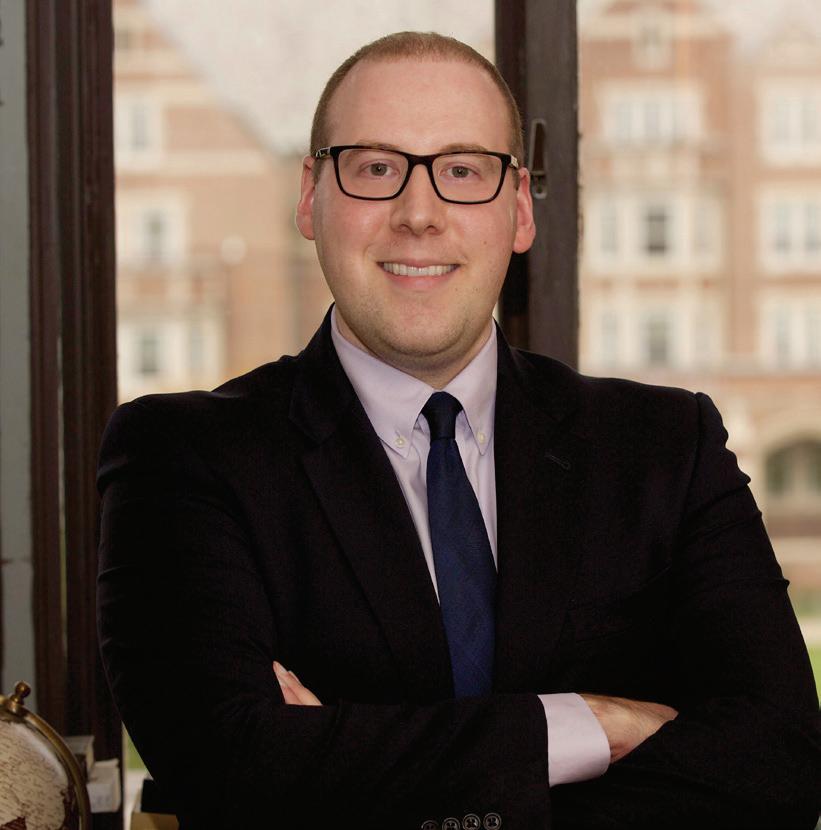
6 minute read
Center for Ethics, Religion and Culture
from Spring 2020 Magazine
by Elms College
Professor and Alumnus Helps Craft Ethical Guidelines for Treating COVID-19 Patients Across the Globe

The COVID-19 pandemic and resulting shortage of key medical DePergola said the response of the medical community to supplies and equipment throughout the nation’s healthcare the comprehensive guidelines that he developed for Baystate system has raised a multitude of ethical questions, among Health and published for the world to see “has been incredibly them: Who should receive priority for limited resources? How positive, and it has significantly helped my colleagues at the should the needs of vulnerable populations be addressed? How bedside, both locally and otherwise.” and when should information be provided to the public? What The most difficult ethical issues that are arising at the bedside, standards of care would be expected when staff, equipment he said, “are the fear of providers going to work every day, not and medications are insufficient to meet the demand and to having the typical standards provide the level of care that is expected during non-emergency “Never in a million years did I think of care at work, rushing very delicate conversations about times? What guidance should be made available to clinicians that the doctoral training I received end-of-life care, not requiring the usual permission to change to assist them in making fair and responsible decisions under in disaster bioethics would ever need the code status (i.e., CPR and intubation status) of patients, these circumstances? These questions and more are to be applied in my personal life,” de-escalating critical care treatment, and seeing much addressed in the comprehensive ethical guidelines that Peter DePergola said. more death than usual.” Following a letter he coDePergola II ‘07, Ph.D., MTS, authored in partnership with the Hastings Center — the associate professor of Bioethics and Medical Humanities, nation’s largest bioethics think tank — and sent to the White developed for Baystate Health, where he serves concurrently House to implore the U.S. government to immediately use its as director of clinical ethics and chief of the Ethics federal power and funds to respond to the COVID-19 pandemic Consultation Service. as a matter of moral imperative, DePergola was contacted by
the commissioner of the Massachusetts Department of Public Health (MDPH) and appointed to the Commonwealth’s Crisis Standards of Care (CSC) Advisory Committee. Composed of a 17-member group of high-octane experts — the majority of whom hailed from Harvard Medical School, Massachusetts General Hospital, Beth Israel Deaconess Medical Center, and Boston Children’s Hospital — the CSC Advisory Committee formed the ethical guidelines for treating patients with suspected or confirmed COVID-19 throughout the state. The meetings, held via the web meeting interface Zoom, “had vigorous debates about things such as who should receive limited resources in the event that not all can, and what clinicians should do in situations in which ‘ties’ arose in priority scoring between patients who were vying for the same scarce resource,” DePergola said. “We talked about things such as the relevance of age, socioeconomic status, and contributions to society, as well as how (if at all) to adequately prioritize the care of healthcare workers.” The committee’s document, titled “Crisis Standards of Care Planning for the COVID-19 Pandemic,” was released in early April, and provides concrete guidance for the triage of critically ill patients in the event that the public health emergency caused by the COVID-19 pandemic creates demand for critical care resources that outstrips the supply. “It was an experience that I never imagined being a part of,” DePergola said. “Most shocking, perhaps, was the fact that I was the most junior member of an extremely elite group by some 20-plus years. Yet, based on my experience and expertise, the group genuinely wanted to hear what I thought, and how I had formed such a comprehensive guideline for the western part of the state at Baystate Health.” Shortly after the release of the CSC document, DePergola published a revision of the clinical guidelines he developed for Baystate Health in a 59-page white paper, “Ethical Guidelines As a Catholic college founded by the Sisters of St. Joseph of Springfield, Elms College has long served as a place where thoughtful discourse on topics of faith, reason, ethics, and culture is welcomed and encouraged. In that spirit, the college is planning to launch the Center for Ethics, Religion and Culture (CERC), which will welcome engagement and dialogue among all traditions, without distinction, on the most pressing and complex questions of ethics, faith, reason, and culture today. CERC programming will advance research, scholarship, and education in ethics; examine religious and spiritual values and their compatibility with scientific and philosophical reasoning; and foster lives of cultural awareness, appreciation, and meaning. Leading CERC’s development is Peter DePergola II, Ph.D., MTS, associate professor of Bioethics and Medical Humanities. The CERC will facilitate the development of distinctive academic programs in Bioethics and Medical Humanities, in which the college currently offers a minor. Future master’s and doctoral programs planned in this area “will make Elms College one of for the Treatment of Patients with Suspected or Confirmed Novel Coronavirus Disease (COVID-19),” in the Online Journal of Health Ethics. His reason for publishing the guidelines, DePergola said, was so that “clinicians’ moral distress may be mitigated and lives can be saved in a fair, reasonable, and objective way.” “It gained traction rapidly both nationally and internationally,” DePergola said of the bioethics community’s response to his paper. Although he was contacted by multiple peer-reviewed journals to publish (in revised form) the comprehensive ehtical guidelines he developed for Baystate Health, “In the spirit of the Sisters of St. Joseph, I chose a humble, free, and globally-accessible journal to make sure that everyone — no matter their geographical location or ability to pay — would have access to the guidance contained therein,” DePergola said, adding that “The mission of the SSJs — to provide a high-quality education to those least likely to access it — is forever emblazoned in my mind.” The experience of writing the guidelines, while extremely worthwhile and desperately needed, did take a toll. “I really can’t tell you the emotionally dark place you enter when you write these guidelines, talk about them nonstop, and think about them all day, every day, for an extended period of time. I have felt like I’m living in a movie. Waking up to a racing pulse in the middle of the night is a regular occurrence in my house. Never in a million years did I think that the doctoral training I received in disaster bioethics would ever need to be applied in my personal life,” DePergola said. “To think that the richest nation in the history of the world found itself needing to race to manufacture tens of thousands of ventilators, basic personal protective equipment, and contingency planning is absolutely astounding to me. It is a dark stain on our history, and we have much work to do in the future to make sure that whatever happens, whenever it happens, wherever it happens, we
are prepared to deal with it.” extremely few institutions – and, with the doctoral degree, the only institution – in the U.S. with such programs,” DePergola said. “The CERC connects us more deeply to our liberal arts core by challenging students to remain rooted in faith, educated in mind, compassionate in heart, and responsive to civic and social obligations; binds us faithfully to our core values of Faith, Community, Justice, and Excellence; and forwards our Elms+ strategic plan of Excellence, Ethics, Experiential Learning, Engagement, and Enrollment,” said Elms College President Harry Dumay, Ph.D., MBA. “The work of the Institute for Theology and Pastoral Studies (ITPS) and Campus Ministry will be complementary and synergistic to the work of the CERC, especially when it comes to programming and outreach that serves the Diocese of Springfield,” said Vice President of Academic Affairs Walter C. Breau, Ph.D. “Current programs such as the Mary Dooley Lecture Series, the Rev. Hugh Crean Distinguished Lecture Series, and the Hispanic Lay Ministry Program are excellent examples of programs that would benefit through the cooperation of the CERC and ITPS.”




